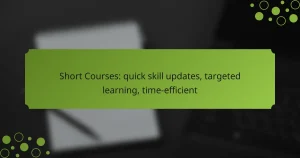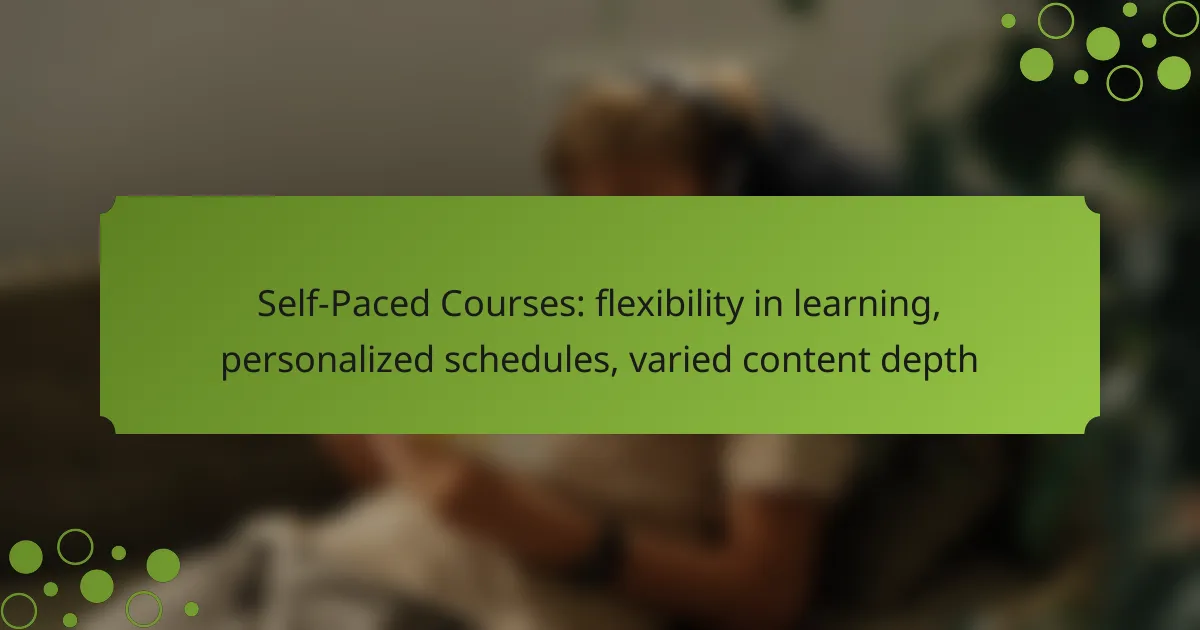
Self-paced courses provide a unique opportunity for learners to engage with educational material on their own terms, allowing for personalized schedules and varied content depth. This flexibility accommodates different learning styles and personal commitments, making it easier for individuals to achieve their educational goals. By selecting courses that align with their interests and needs, learners can create an effective and accessible learning experience.
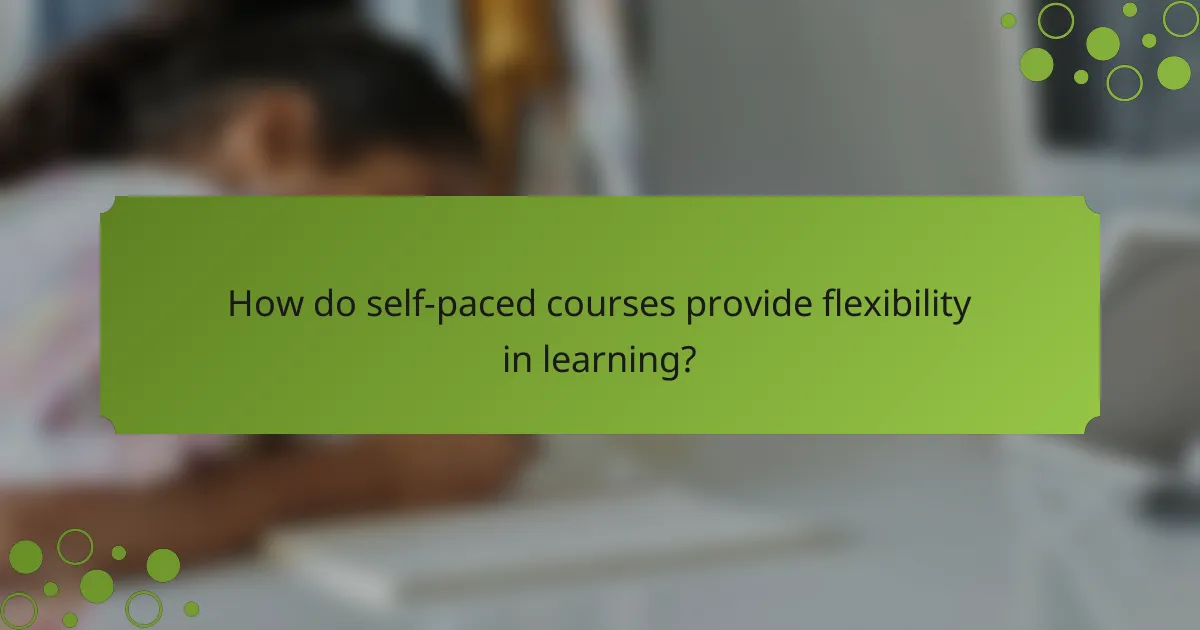
How do self-paced courses provide flexibility in learning?
Self-paced courses offer flexibility in learning by allowing individuals to choose when and how they engage with the material. This approach accommodates various schedules and learning styles, enabling learners to progress at their own convenience.
Personalized learning schedules
With self-paced courses, learners can create personalized schedules that fit their lifestyles. This means they can allocate time for study based on personal commitments, such as work or family obligations.
For instance, a busy professional might dedicate evenings or weekends to coursework, while a student may prefer to study during the day. This flexibility helps maintain motivation and reduces stress associated with rigid timelines.
Access to diverse learning materials
Self-paced courses typically provide access to a wide range of learning materials, including videos, articles, and interactive quizzes. This variety allows learners to choose resources that resonate with their preferred learning styles.
For example, visual learners may benefit from video content, while those who prefer reading can focus on written materials. This access to diverse content enhances understanding and retention of information.
Ability to learn at one’s own pace
The ability to learn at one’s own pace is a key feature of self-paced courses. Learners can spend more time on challenging topics while moving quickly through areas they grasp easily.
This individualized approach helps prevent frustration and promotes a deeper understanding of the material. For instance, a learner struggling with a complex concept can revisit lessons as needed without the pressure of a fixed schedule.
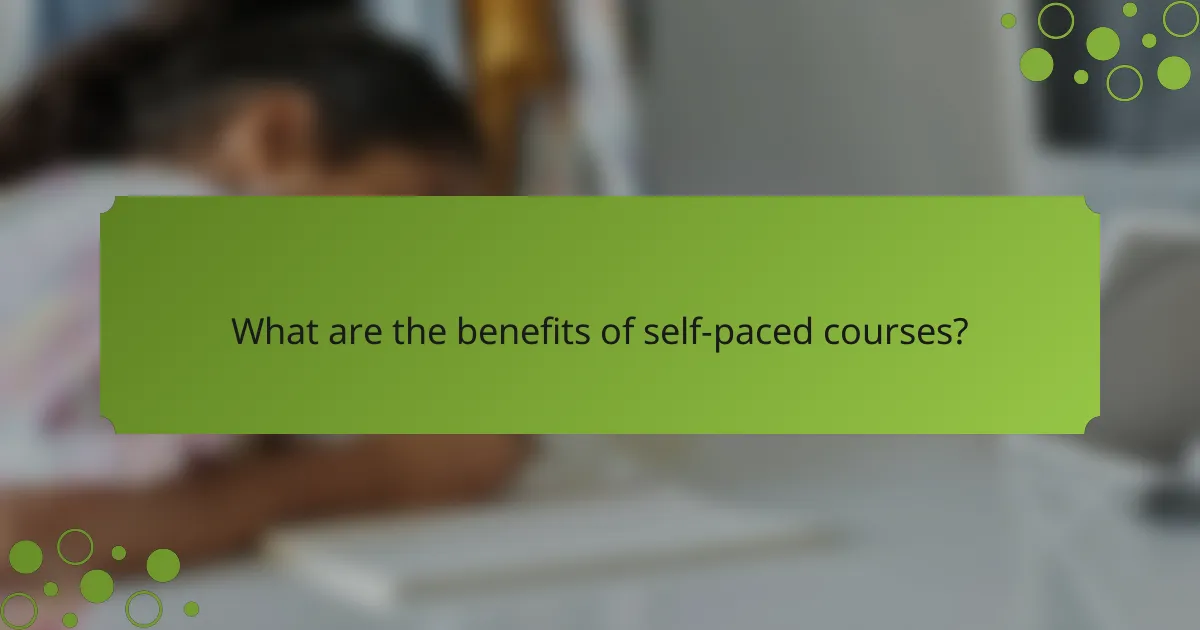
What are the benefits of self-paced courses?
Self-paced courses offer flexibility in learning, allowing students to tailor their schedules and study at their own pace. This approach accommodates diverse learning styles and personal commitments, making education more accessible and effective.
Improved retention of information
Self-paced courses enhance retention by allowing learners to revisit materials as needed. This repetition reinforces understanding and memory, leading to better long-term retention of information compared to traditional classroom settings.
For instance, a student can spend additional time on complex topics or review lessons multiple times without the pressure of a fixed schedule. This personalized approach caters to individual learning speeds, which can significantly boost comprehension.
Enhanced motivation and engagement
Self-paced learning fosters motivation by giving students control over their educational journey. When learners can choose when and how to study, they are more likely to stay engaged and committed to their courses.
Additionally, the ability to set personal goals and track progress can create a sense of achievement. For example, completing a module at one’s own pace can lead to increased satisfaction and a desire to continue learning.
Cost-effectiveness compared to traditional courses
Self-paced courses often come at a lower cost than traditional classroom courses, making them a budget-friendly option for many learners. They eliminate commuting costs and can reduce expenses associated with physical materials.
Moreover, many online platforms offer free or low-cost self-paced courses, allowing learners to access quality education without significant financial investment. This affordability makes it easier for individuals to pursue continuous learning and skill development.

How to choose the right self-paced course?
Choosing the right self-paced course involves assessing your learning goals, the depth of content, instructor qualifications, and the usability of the platform. Prioritize courses that align with your interests and provide a flexible learning experience tailored to your schedule.
Evaluate course content depth
Understanding the depth of course content is crucial for effective learning. Look for courses that clearly outline their curriculum, including the topics covered and the complexity of the material. For instance, a course that offers beginner to advanced levels can cater to varying skill sets.
Consider whether the course includes practical assignments, quizzes, or projects to reinforce learning. A well-structured course may provide a mix of video lectures, readings, and interactive elements to enhance engagement.
Consider instructor qualifications
The qualifications of the instructor can significantly impact the quality of the course. Research the instructor’s background, including their education, professional experience, and teaching style. Instructors with relevant industry experience often provide insights that enrich the learning experience.
Check for reviews or testimonials from previous students to gauge the instructor’s effectiveness. A qualified instructor should not only be knowledgeable but also skilled in conveying information clearly and engagingly.
Assess platform usability
The usability of the learning platform is essential for a smooth educational experience. Evaluate how easy it is to navigate the site, access course materials, and track your progress. A user-friendly interface can enhance your motivation and reduce frustration.
Look for features such as mobile compatibility, discussion forums, and customer support. These elements can make a significant difference in your overall learning experience, allowing you to study conveniently and seek help when needed.
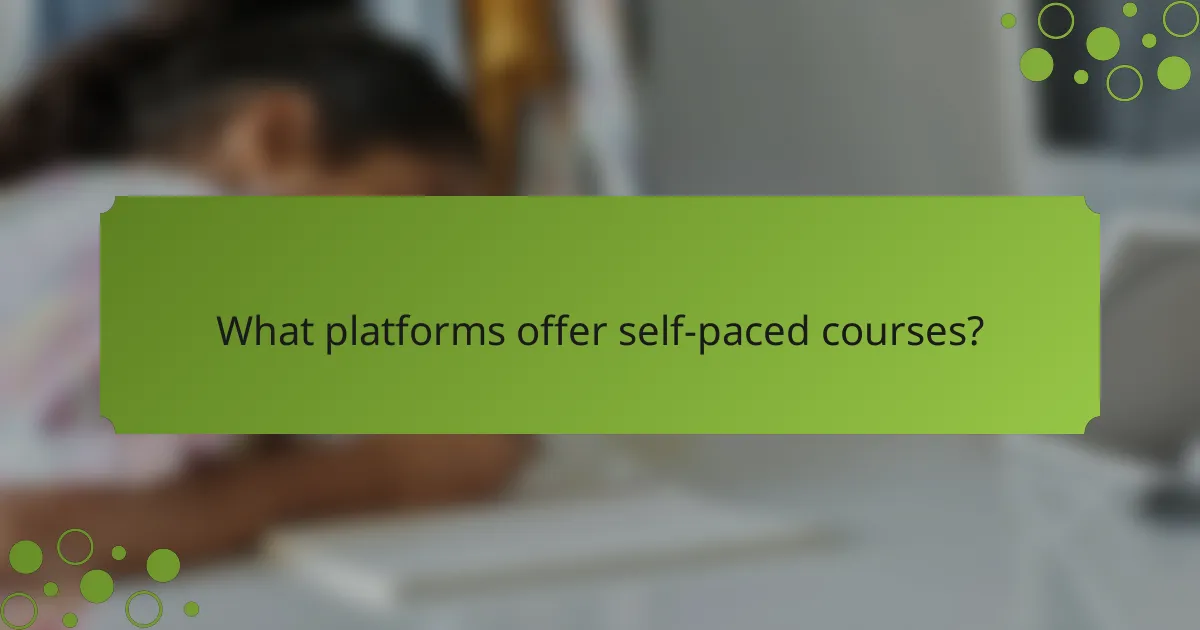
What platforms offer self-paced courses?
Several platforms provide self-paced courses that allow learners to study at their own convenience. These platforms cater to various interests and professional needs, offering a range of content from academic subjects to personal development.
Coursera for professional development
Coursera partners with leading universities and organizations to offer self-paced courses focused on professional development. Users can enroll in courses that cover essential skills in fields like business, technology, and health.
Courses often include video lectures, quizzes, and peer-reviewed assignments. Many programs also offer certificates upon completion, which can enhance a resume or LinkedIn profile.
Udemy for diverse topics
Udemy features a vast library of self-paced courses across numerous subjects, from photography to programming. This platform allows instructors to create and sell their courses, resulting in a wide variety of content.
Courses are typically available for a one-time fee, and learners can access them indefinitely. Users should check ratings and reviews to select high-quality courses that meet their needs.
edX for academic courses
edX offers self-paced courses from prestigious institutions, focusing on academic subjects and professional skills. Many courses are free to audit, with a fee required for certification.
Courses often follow a structured format with deadlines, but many allow flexibility in pacing. This platform is ideal for learners seeking to deepen their knowledge in specific academic areas or earn credits that may transfer to degree programs.
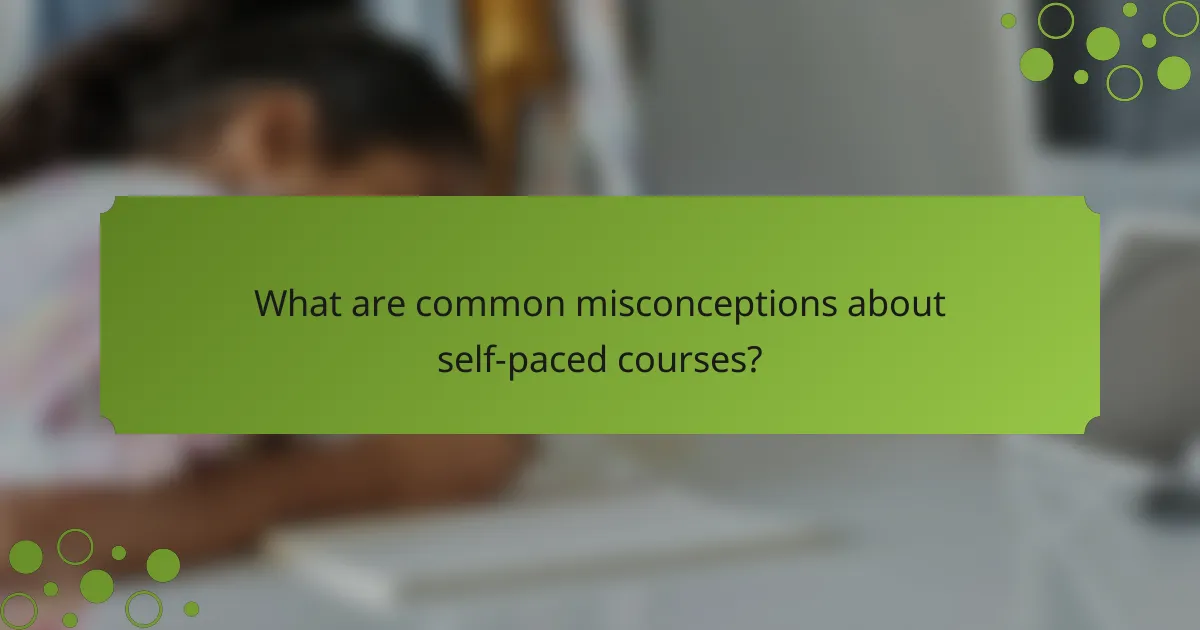
What are common misconceptions about self-paced courses?
Self-paced courses often face misconceptions that can deter potential learners. Many believe these courses lack interaction, are of lower quality, or that staying motivated is challenging.
Lack of interaction with instructors
A common belief is that self-paced courses offer minimal interaction with instructors. However, many platforms provide various ways to engage, such as discussion forums, live Q&A sessions, and email support. This allows students to seek clarification and guidance, ensuring a more interactive learning experience.
To maximize interaction, learners should actively participate in forums and reach out to instructors when needed. This proactive approach can enhance understanding and foster a sense of community.
Perceived lower quality of education
Some people assume that self-paced courses are of inferior quality compared to traditional classroom settings. In reality, many self-paced courses are developed by reputable institutions and industry experts, offering high-quality content that is regularly updated.
When selecting a self-paced course, look for accreditation, reviews, and the qualifications of the instructors. This can help ensure that the education received meets high standards.
Difficulty in staying motivated
Many learners worry that self-paced courses will lead to a lack of motivation and discipline. While it can be challenging to stay on track without a structured schedule, setting personal deadlines and creating a study plan can help maintain focus.
Consider using tools like calendars or productivity apps to set reminders and track progress. Joining study groups or online communities can also provide accountability and encouragement, making it easier to stay motivated throughout the course.
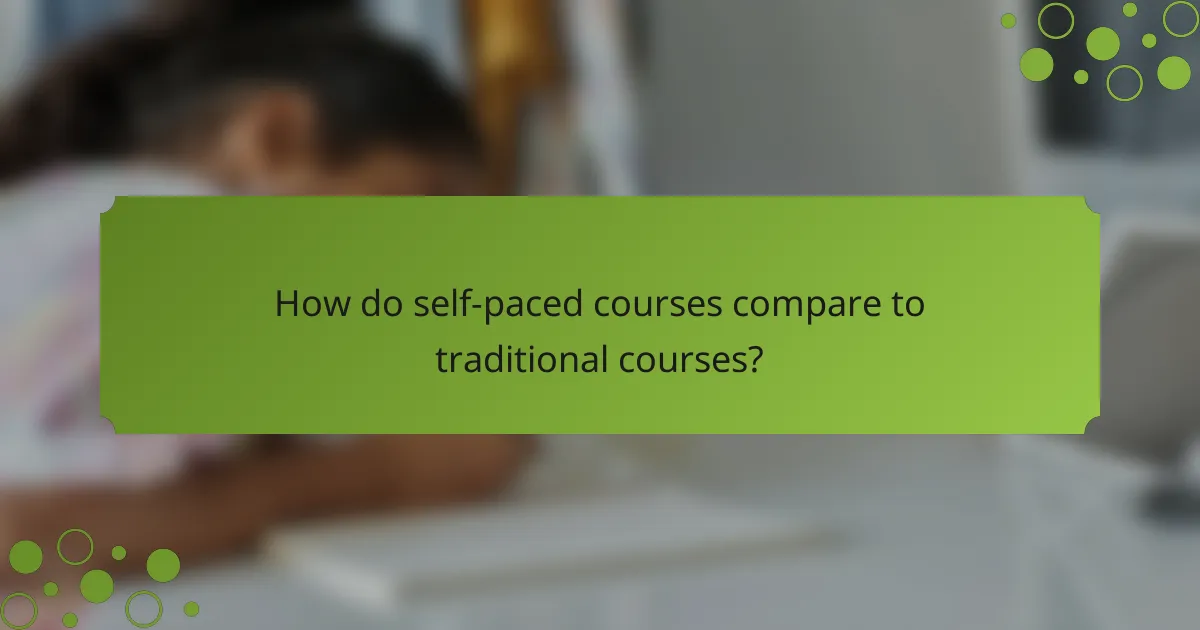
How do self-paced courses compare to traditional courses?
Self-paced courses offer a more flexible learning experience compared to traditional courses, allowing learners to set their own schedules and progress at their own pace. This approach caters to individual learning styles and commitments, making education more accessible for many students.
Flexibility vs. structured learning
Self-paced courses provide the freedom to learn anytime and anywhere, which is ideal for those with busy schedules or varying commitments. In contrast, traditional courses typically follow a fixed timetable, requiring attendance at specific times and locations.
This flexibility allows learners to spend more time on challenging topics or move quickly through familiar material. However, it requires self-discipline and motivation to stay on track without the structured environment of a classroom.
Cost differences
Self-paced courses often have lower upfront costs compared to traditional courses, which may include tuition fees, commuting expenses, and materials. Many online platforms offer courses at a fraction of the price of in-person classes, making education more affordable.
However, it’s essential to consider the potential long-term costs of self-paced learning, such as the need for additional resources or support. Additionally, some employers may prefer candidates with traditional degrees, which could impact job opportunities in certain fields.

